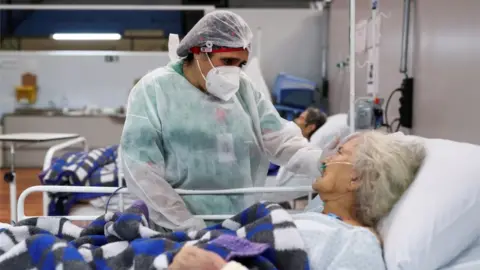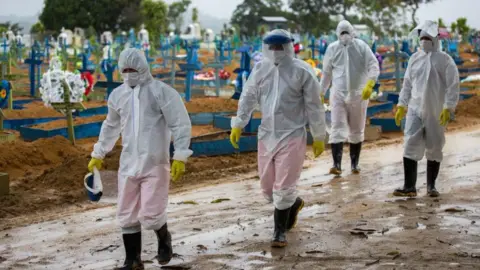Covid-19: Brazil experts issue warning as hospitals 'close to collapse'
 Reuters
ReutersHealth systems in most of Brazil's largest cities are close to collapse because of Covid-19 cases, its leading health institute warns.
More than 80% of intensive care unit beds are occupied in the capitals of 25 of Brazil's 27 states, Fiocruz said.
Experts warn that the highly contagious variant in Brazil may have knock-on effects in the region and beyond.
"Brazil is a threat to humanity," Fiocruz epidemiologist Jesem Orellana told the AFP news agency.
The country has recorded more than 270,000 deaths and 11.2 million cases since the pandemic began.
It has the second-highest number of deaths in the world after the US and the third-highest number of confirmed cases.
Despite this, President Jair Bolsonaro has consistently sought to downplay the threat posed by the virus. Earlier this week he told people to "stop whining".
He has also opposed quarantine measures taken at a regional level, arguing that the damage to the economy would be worse than the effects of the virus itself.
What's the situation in Brazil?
On Wednesday, the country recorded 2,286 Covid deaths, a new daily record.
According to Fiocruz, 15 state capitals have intensive care units (ICUs) that are at more than 90% capacity including Rio de Janeiro and São Paulo.
Some reports say Brasilia has now reached full ICU capacity, while two cities - Porto Alegre and Campo Grande - have exceeded capacity.
In its report, the institute warned that figures point to the "overload and even collapse of health systems".




Brazilian epidemiologist Dr Pedro Hallal told the BBC's Outside Source TV programme: "If we do not start vaccinating the population here very soon, it will become a massive tragedy."
Dr Hallal, who works in Rio Grande do Sul, said people felt "abandoned by the federal government".
Meanwhile, Brazil's former leader Luiz Inacio Lula da Silva attacked President Bolsonaro for his "imbecile" handling of the pandemic.
In his first speech since corruption convictions against him were annulled, he said on Wednesday: "Many of these deaths could have been avoided."
On Wednesday, the country recorded 79,876 new cases. A surge in cases in recent days has been attributed to the spread of a highly contagious variant of the virus - named P1 - which is thought to have originated in the Amazon city of Manaus.
What do we know about the Brazil variant?
Preliminary data suggests the P1 variant could be up to twice as transmittable as the original version of the virus.
It also suggests that the new variant could evade immunity built up by having had the original version of Covid. The chance of reinfection is put at between 25% and 60%.
 Getty Images
Getty ImagesLast week, the Fiocruz Institute said P1 was just one of several "variants of concern" that have become dominant in six of eight states studied by the Rio-based organisation.
"This information is an atomic bomb," said Roberto Kraenkel, of the Covid-19 Brazil Observatory, told the Washington Post newspaper.
World Health Organization Director General Tedros Adhanom Ghebreyesus has described the situation in Brazil as "very concerning" and warned of a possible regional spillover.


Scientists are concerned that Brazil has almost become a "natural laboratory" - where people can see what happens when coronavirus goes relatively unchecked.
Some warn the country is now a breeding ground for new variants of the virus, unhindered by effective social distancing and fuelled by vaccine shortages.
That's because the longer a virus circulates in a country, the more chances it has to mutate - in this case giving rise to P1.
Global experts are calling for a plan - including rapid vaccination, lockdowns, and strict social distancing measures - to get the situation under control.
The worry is that the P1 variant is a looming threat over the progress made in the region and the wider world.
Current vaccines are, on the whole, still effective against the variant but may be less so than against the earlier versions of the virus they were designed to fight.
Studies are ongoing but experts will get their most robust understanding of how well these vaccines work against P1 as they continue to monitor people who have been vaccinated in the real world.
Scientists are confident that, if necessary, vaccines can be tweaked fairly quickly to work against new variants.

Which vaccines work against the variant?
Brazil has ordered more than 200 million doses of the Oxford-AstraZeneca and CoronaVac vaccine. So far, more than eight million people have had their first dose, representing just 4% of the population.
Preliminary studies of the AstraZeneca vaccine suggest it would protect against the P1 variant, although the team behind the vaccine earlier said it offers less protection - but should still protect against severe illness.
Another Brazilian study has reportedly indicated the CoronaVac vaccine, made by China's Sinovac biopharmaceutical company, is effective against the same variant.
The Pfizer-BioNTech vaccine has also been able to combat the Brazil variant, according to laboratory research published by the New England Journal of Medicine.
However, the Pfizer vaccine has not yet been rolled out in the country, as Brazilian authorities are still in negotiations with the company over its purchase. According to Reuters news agency, Economy Minister Paulo Guedes said Pfizer had agreed to deliver 14m doses by June after a video call with President Bolsonaro.
